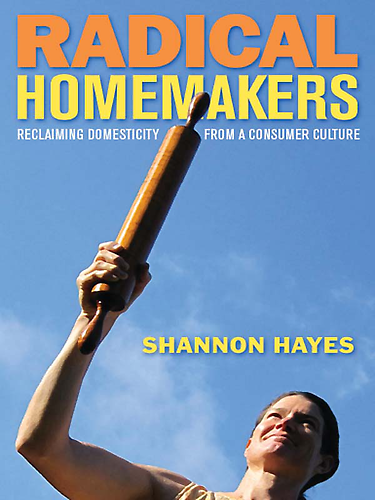Imagine a world where men and women, well educated with Master’s degrees and PhDs, choose to reject the high stress, consumerist corporate world in favour of tending to kith and kin. Imagine houses with gardens overflowing with fruits and vegetables, a small chicken coop in the backyard and pantries and cupboards bursting with homemade goods. For Shannon Hayes, author of Radical Homemakers: Reclaiming Domesticity from a Consumer Culture this world is a hard fought reality.
Radical Homemakers profiles a group of individuals from across the United States who view their home not as a refuge from work and the outside world, but as a political and ecological tool for change. Rather than viewing their households and themselves as units of consumption, they see themselves as units of production. They attempt to shift society’s total emphasis on income by growing much of their own food, living within their means, and relying on community, family and bartering for their remaining needs. They move from what Hayes has dubbed “the extractive economy” to “a life-serving economy.”
Hayes has experienced all of this first hand. She was born in the rural United States where she spent her time outside of school working on a neighbouring farm. There she was able to observe her neighbours’ ability to live off a small income by producing much of what they needed on their own. By the age of 27, Hayes had attained her PhD, but she yearned to return to the farm. After some soul-searching, she and her husband moved onto a farm with her parents. While home-schooling their two daughters, they tended livestock, cut meat, kept an ample vegetable garden while still managing to go on the occasional vacation, all while living on less than $45,000 a year. During that time, she was able to observe the effect homemaking has on our food system. This led her to seek out other homemakers who were living just like her — radically.
Hayes interviews 20 people around the U.S. who have also become radical homemakers. Many are couples who were tired of the corporate lifestyle, and of not having any time to spend with their growing children. One of the most interesting insights to emerge from Hayes’ interviews was each homemaker’s view on health insurance. Many had chosen to forgo conventional health insurance, opting for their own brand of insurance, one that involves homeopathic medicine, natural remedies and a diet of nutrient dense foods. At first, the idea of not having any sort of conventional health insurance is hard to swallow, however Hayes does an excellent job of demonstrating how a more natural approach to healthcare is not only beneficial, but possible.
While many of the people she profiles in the book are living what seems to be an ideal lifestyle, the reader is often left wondering, is this really doable? A lot of the homemakers interviewed were able to make their lifestyle switch because of early inheritances or financial help from family, which for some is just not possible. I wondered if it would be possible to become a radical homemaker without the money to purchase a plot of land, build a farm, or even simply plant a garden?
Still, while this question remains somewhat unanswered, Hayes has created a comprehensive book which showcases and inspires ideals which benefit our communities, families, health and humanity as a whole. Radical Homemakers provides hope in a world reeling from an economic downturn, dwindling resources and climate change.—Katie O’Connor




